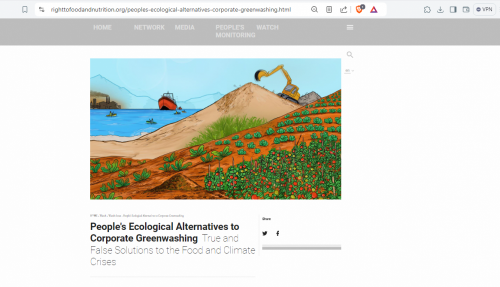
https://www.righttofoodandnutrition.org/peoples-ecological-alternatives-...
Industrial food systems have failed to meet the nutritional needs of our planet's population. Close to 800 million people face hunger today. Our food systems produce a third of all greenhouse gas emissions, contributing massively to the climate crisis and exacerbating access to food and nutrition. The mass extinction of species, destruction of ecosystems and disruption of the natural cycles that sustain life on Earth further affects access to food.
Extractivism, commodification and financialization of nature have exacerbated exploitation, dispossession and violent evictions. The increasing control of natural resources by a small number of powerful corporations, individuals and states is also fuelling gender-based violence, intersecting forms of discrimination, and mounting inequality.
People's Ecological Alternatives to Corporate Greenwashing proposes a different way forward based on grassroots struggles against corporate capture, greenwashing and neocolonial practices. It promotes the right to food and adequate nutrition, the human rights of peasants and other people in rural areas, and food sovereignty for all.
It is divided into four sections examining international developments, food and the triple ecological crises, green colonialism and decarbonization, and grassroots struggles and solutions to the climate and food crises.
Despite the worsening food crisis, there was little decisive international action during 2023 to address its causes. Instead, corporate capture of international fora, notably at the UN, continued unabated. The food and triple ecological crises of climate, biodiversity loss and pollution are inextricably linked, yet corporations and states promote similar technological solutions for each and fail to address the rights of small-scale food producers.
In recent years, decarbonization and related market-oriented approaches have been imposed as the main paradigm in addressing these intertwined crises. But this green neo-colonialism simply perpetuates eco-destruction and the commodification of nature, while deepening existing inequalities.
A just eco-social transformation of our food systems that protects everyone's right to food and nutrition requires global justice and the fostering of food sovereignty, harmony and balance between humanity and the environment.









